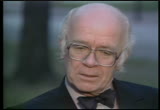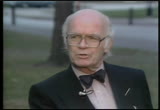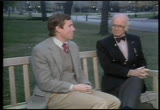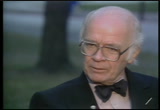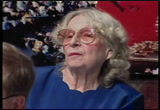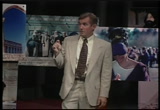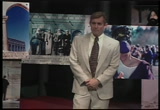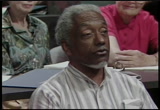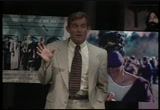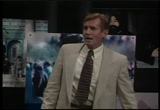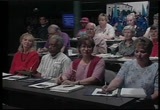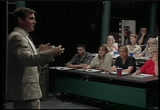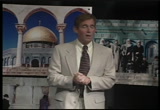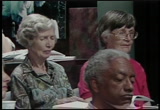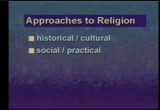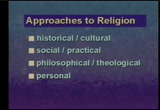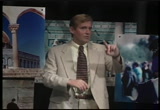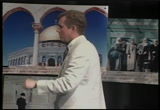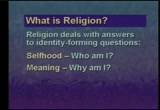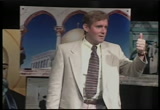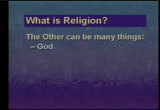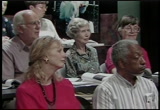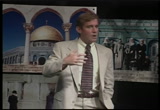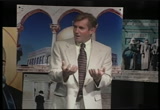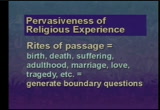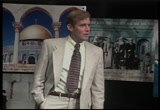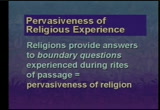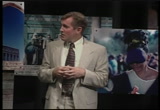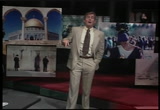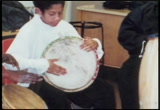tv Witness LINKTV February 6, 2013 7:30pm-8:00pm PST
7:30 pm
these are engineers and physicians and so on. illinois attracts that because we are a crossroads. we are a diverse kind of market and people come from all over and that's what, i think, we have to come to terms with because, while the city of chicago itself has long been ethnic, it was still a simple pattern and today it's a complex pattern. [interviewer:] okay, what about protestantism in general? you're, of course, a world expert on protestant christianity. are we going to see some changes in that? are we going to see a continued rise of fundamentalist church and a drop off in attendance in mainstream liberal protestantism? [prof. marty:] i think that the mainstream catholic protestant and reformed and conservative jews will, if i could use a very crass term, hold their part of the market. they'll decline relatively simply because of their great growth of black protestants and hispanics, some catholics, some protestants. but there aren't very big cohort moves.
7:31 pm
the people who are now moderate and liberal and black protestants are not in the surge towards fundamentalism. hard core fundamentalism, i don't think has as much future as moderate evangelicals and the pentecostals. i think that's where the future is. it's pretty hard to stay hardcore fundamentalist in america. there are so many lures out there and to build rather thick walls is frustrating. it will remain around, but i would watch much more for the exuberant groups black pentecostal, white pentecostal and moderate evangelical. [interviewer:] okay, one of the difficulties people come uwith when we talk about religious diversity and a classroom religious pluralism there's a tendency to say, "well, if you study all the religions, you water down your own religion." is there a way that a model or technique people might use, to cherish the integrity of their own views yet appreciate other worldviews or are we just barking up the wrong tree here? [prof. marty:] what's the big difference between appreciating and adopting?
7:32 pm
we once had a class in this campus where four people gave the views of the catholic mass. one took the role of freud, one of marx, one of marx's favorite, one of durkheim, four great students explaining that the mass is nothing but this, nothing but that. and after it was over a student in the class said that was very - you should have somebody there who believes in it. we said, "two of them do." a catholic can take on the role of being sigmund freud interpreting something in order to understand the phenomenon without yielding. i am a very reasonably intense member of the christian communion and for the last 35 - 40 years, i've been studying others. i believe i have real appreciation for them. i don't think i will go to the apostolic church of god in christ, and say you've got to stop being natural, i've to be what i am. and, i don't, even when i am in kyoto, try to subvert the buddhism there. i may wish more people believe as i do but i wouldn't understand anything if i try to impose that.
7:33 pm
so, yes, some people can find it undercut. i think one reason fundamentalism's goal, some people do try to build the thick walls so there's no danger of something permeating, but by and large americans have remained fairly faithful to their own communions while bumping into everybody. [interviewer:] well, professor marty i really want to thank you for an excellent interview. thank you very much. [dr. simons:] comments on professor marty's thoughts, i mean, did you see how we - we almost covered him, you know, what he had to say. but any other comments that you might have? [female voice:] i found out that my religion grows deeper as i brush up against other faiths because it then sets me seeking the sources of why i believe what i do. so, to me i think i've been deeper in my faith through the years being exposed to myriad religions. [dr. simons:] and i think that's what professor marty is saying. you know, you get that picture from his travel. i mean, you'd be surprised at the diversity even in an area
7:34 pm
like chicago, but there's a huge diversity and people coming to try to understand their life and their meaning and their sense of self, all of these things going on. wonderful. jan? [jan:] i thought what's common about some fundamental sects needing to build thick walls point to danger - danger of open mindedness by any chance? i don't know. i thought it was interesting the way you described the walls - coz, if you build the walls, you keep something in - but you also keep a lot of things out. [dr. simons:] well, we're going to touch on that here. maybe not in this class, the way we're on the roll here, but we are because the importance of identity and what forms identity and sometimes, and we know this in the case of religion, sometimes fear is the motivator. sometimes fear is why those walls have to be so big and what do we do with that. i mean, that's a toughie. i mean that's a challenge, but, boy, do we see that over in the middle east. yes, susan? [susan:] i'd like to say that i feel like i saw a really good model for that
7:35 pm
in the home i grew up in. my mom was the catholic in the family and she, we frequently had visitors from my dad's side. they were all protestants. before any of them were coming to see us, though, she would find out when all the services were and this was a learning experience for her. she got to know the different kinds, different ministers and so forth. she had the information and then she would say to us something like: "now when aunt margaret and uncle albert come to visit us, they may go to church or they may not. because that's there way and that's fine. now, we, of course, will because that's our way." that's it. and then along with respecting other - and when we stayed in bloomsberg for a summer or a month or whatever it was, there were no catholics there but they found out from father bert where the masses were and my grandmother and my aunt, they made sure that we got there. i think they developed a pretty nice relationship with father bert, none of them changed their faith homes [dr. simons:] that's a caring. [susan:] it is.
7:36 pm
[dr. simons:] it is learning and appreciation. [susan:] along with the respect, i think the point is that i already had affection for these people and so it was respect and affection for everything that went with them including their belief system, and we could talk about these things. [dr. simons:] yes. sure. [male voice:] it seems to me that along with opening up our minds to religious diversity, and i can't say that there's anything that we can call truth in a religion. it's a matter of belief. but along with opening up our minds to religion diversity, it seems to me that we are bound to come across religious beliefs along with the proliferation of cults of all kinds of temperatures and degrees that seem to us to be un-genuine, cons, scams, perpetuated by clever leaders and not in just this country but all over the world. so, it seems to me that we do have to be open to the fact that there are such people. some of them are being convicted of crimes in courts. so that diversity is fine and i think we need to examine it
7:37 pm
but i think there's a downside and we going to find some un-tasty bits. [dr. simons:] well, i want to thank you for a little reality check there because, you know, we have to be aware of that. you're absolutely right on. you know, as we move through this, if you get out there in the real world and just say, "oh, all religions are great. sign me up." well, you know, you do have to be careful and there are some situations and we've seen them here, which is one of the reasons why in this class, and, you know, keep us honest here as we move through the semester because having good worldview analysis skills makes one able to make those kinds of, you know, adjustments in your thinking about things and not all powerful religious ideas are for the good of all people and when we get to the heart of this course, doctrine, belief and ethics behavior, that's really where we're getting down to the nitty-gritty, you know.
7:38 pm
we're going to watch for that. and also, as we move through this, we're going to be looking at sects and cults and finding ways to develop some mutual criteria for determining what they are. but at the same time, you know, keeping our eyes open to what we're going through on the journey. you know, we're just kind of cruising along here. hold on to questions. i want to share some notes with you. you know, this is a college course, folks, so we've go to take notes, you know - i mean, on the graphics, actually. let me, we had a wonderful start here. it's the introductory course and i just want to take what we've already discussed and we've moved through and simply apply it, get it out right here in the first class on what religion studies is. this is a religious studies class. it's not theology and i thought if we just move down, you know, rather quickly with these notes, everyone will feel comfortable about where we're headed in the class. then, i sometimes call this a boring stuff, but it's not boring - absolutely necessary. then we can get into looking at some
7:39 pm
of the most fundamental essence of, you know, what religion is. but just to go through this and feel free to ask and bring things up if you have any comments. it's just some characteristics. first off, religious studies is multi-disciplinary. i mean it's like cultural studies or african-american studies. we use many different disciplines, i should have made this known. i am actually trained as a sociologist and historian. i once was in a theological seminary but i think i was just looking for the restrooms so that was the extent of my experience. i had no theological background. i am a historian and a sociologist. these are some of the tools that i use and certainly you'll get to feel in this class. descriptive, phenomenological - in grad school, you know, it takes one full semester to learn to say, phenomenological. but, it simply means that we describe, we look at religious phenomena and we comment on it
7:40 pm
without necessarily making some kind of judgment about the true statement. okay on that. we're just moving right along here, just terms and the characteristics. polymethodic - many methods in order to understand something as complex as religion, we need all the tools we can get so we'll use - you'll find anthropology in here, little political science, certainly some psychology. but religious studies, i think that's why i got into it because of my own quest to try to understand the nature of what it means to be human. i was always sort of frustrated with one methodology in psychology or one methodology in, say, history. i wanted something wider and i stumbled upon this relatively new field and i should mention that also. religious studies, though theology and the quest to understand human existence goes back to the dawn of time, religious studies is really only about 35, 40 years old.
7:41 pm
it's a relatively new field. in fact i'm only the first generation of religious studies professors who are trained at state universities. so, it's relatively new and - but i think the time is ripe and i hope, you know, as we journey through the course that will become evident. polymethodic, multicultural and comparative - we'll look at many different cultures and will compare rituals, will compare myths, will compare these various things and it is certainly part of it. worldview analysis skills - that's what you get for the tuition money you've laid down for this course, hopefully. you get some very practical useable skills that well after this course is over you'll be able to apply in not just settings with religion but any worldview, i mean, your wonderful comment about let's be careful about, you know, what could be dangerous religious cult
7:42 pm
or something like that. these will be skills with neutral criteria. you can move through it and come to some kind of intelligent, informed decisions. so, let's hope we will proceed down here. methodology - our methodology that we will use over and over again is right here. we'll observe. lots of things to observe right here - these beautiful photographs, all of which were from different places that we journeyed in our quest, our phenomenological quest. we'll describe and we'll compare and you folks are already way ahead of the game because obviously we had just an interesting exchange here and we're already doing that kind of thing. so, we'll be doing that, we'll be looking at this phenomena, particularly as it pertains to religion and religious movements. just one last comment here, and feel free when we're through this set here to jump in if you have any questions.
7:43 pm
but just kinds of approaches that we might take to studying religion and we can sort out where we are at here to some extent we do a historical or cultural approach, that's a classic way to go about studying religion. we've had history comments. we've had comments about culture already merged here in class. probably the second one in the list is more what we're doing in this class. not so much history, we're more the social practical approach. in other words, beliefs and believers, down to the nitty-gritty as people believe so they behave and so we want to kind of see how that tracks out and get a feel for it. that's very much what we're doing in our class here. a little bit of the cultural, a little historical, of course, but mostly the social- practical. what we're not doing in here and it seems that most
7:44 pm
of you already, even in our first short time together, you know, have already sense that - we're not doing the philosophical, the theological approach. it's a very genuine and important way to approach religion and someone might go to the seminary at the university of chicago to do that. but that's not our question here. we don't want to come - because we're not interested, maybe individually, but as a group we're not interested in determining truth of reality or religion. we're interested in that power question that ninian smart mentioned. we're interested in the power of it. so that's put us back in the practical and social here. personal - we don't teach religion here. we teach about religion. but, i'm in the trenches. you know, sometimes people think, you know, i'm sort of a commentator. you know, they hire like bill curtis or somebody to run this class. no, i'm an in the trenches teacher of western illinois university and i taught to thousands
7:45 pm
and thousands of students down there. most of them think of me as kind of a metabolic impediment to their more practical goals in life because westerns have very practical schools, so i constantly have to win them over. but, the personal side, nobody has ever come up to me and said for taking this course, beliefs and believers, that somehow it ruined their religious life or confused them. if anything if i hear anything it's usually the opposite. well, that's just not the goal of this class to enlarge in or enliven your particular personal religious search. there's nothing wrong with it if it does occur. and when we become better friends here, a few weeks down the pike, it will be fun to share some of those stories as you begin to reflect on what other people believe. as someone up here so eloquently put it, you know, you can make your own search, your own journey that much richer and we love that. you don't have to pay extra for that. it just comes with it and if it happens, wonderful.
7:46 pm
and we can share those ideas as we move through the journey together. well, let's see. okay. i promised to tell you what i thought religion was and we're not going to get a definition in here. it's the first class, you know, and you're supposed to have a definition but religion means different things to opposite people so, believe it or not, you probably want to quit the class and get a tuition rebate but we're not going to have a definition of religion. but in my quest to try to, you know, think about religion over and over again, i wanted to get down what is the most fundamental? every religion i run across, every worldview, what is the most fundamental, the simplest basis for what goes on? and sure enough, we could argue over this, wonder about it, but we'll come back to this identity and relationship and we'll unpack that in a minute. in fact, let's just go to the next graphic because i think that's a good way to check that out
7:47 pm
when we're talking about identity and relationship. and, you know, when you think about religion, it's so fundamental. i mean it's odd in our society that we think that it's sort of a private affair. you know, that's really kind of strange because religion, the root of it means to link together, to re-link, a quest for unity, a quest for wholeness and so you consider what is it the kind of things that religion any religion answers and you get these identity questions, you know, right of the butt. selfhood. who am i? who am i as a human? that consciousness, human consciousness that we have - other kind of things, meaning questions: not only who am i but why am i? what am i doing here? you know, i don't know. my dog's pretty smart but i don't think she sits around and wonders why she's here. you know, i mean, she gets a bone and that's okay. but that human desire to, you know, philosophical questions,
7:48 pm
to say the least, but, you know, what are we doing here? what does it all mean? and, of course, this brings us to another key identity question which is purpose and, you know, that's a big one. what do i do? no one in the right mind will be sitting in this hot tv studio suffering through lectures on religion if we weren't, we didn't have that instinct, that religious impulse, that, and we can dump the religious worth. we don't need that now but spiritual impulse, impulse towards inquiry about the nature and meaning of life. check that out. see if that isn't something that will see you throughout the semester. the other thing, okay, we got belief. that's in the identity part - you know, all those questions about purpose and meaning and identity. so, we got the identity part in there and the belief part but now we link right into the behavior. what else do religions all do?
7:49 pm
those of you who are in religious traditions, it talks about relationship. how are we to relate to the world around us? how are we to relate to each other? that's the ethical dimension that we're going to be talking about here shortly, one of the most important ones in the course. what is the good life? what is the proper way to relate to each other? and, as you know, we've all struggled with that as human beings for about as long as we've been going on. we struggle it, so, it's very, very difficult. so we'll talk about religion again, identity and relationship and we'll come back but let's just on our graphics, let's just go down and look at some of the things that religions naturally talk about. who is the other? how do we relate to that which is not us, and are all religions speak about god? god is a big one. you know, if your religion happens to speak about that, you sure will want to know how to relate to god. and so, we'll see lots of different great expressions.
7:50 pm
like you mentioned this, you know - the art and the beauty of it. i mean, fabulous, you know, to honor allah, to do that kind of thing. it's amazing. so god's a big one. nature, very important, native american spirituality, we will be looking at that during the semester. how do we relate to the natural world? difficult, difficult to know exactly how to do it but perhaps even more difficult is other human beings. what is our proper relationship to each other? how do we - we prepare words like compassion and caring in here but of course these are very, very important. so, we'll look at different ethical systems about how to relate. other cultures? how do we do that effectively? all of this puts us in an identity, we're here and in that relationship we begin to constantly reform our identity
7:51 pm
and religion works in there to give us patterns, maze ways for doing exactly that sort of thing. some biggies: deaths, sufferings and change. are those inevitable? things that come down the pike, they'll throw us off. life is brutal, life is brief. how do we find meaning? how do we find purpose when, you know, it goes by just like that? you know, how do we make sense of it? these are the things that religions touch on. and, another big one is rights of passage - birth. i think how religion jumps in here. we'll see this with ritual, how ritual steps in there. birth, bar mitzvah, coming to adulthood, marriage, sacred vows of one sort or another, death, all these rights of passage are places where - what happens? we'll look at this but boundary questions are raised up. key questions about identity and relationship come
7:52 pm
up when we see those and that's something that i call the pervasiveness of religious experience. that we'll see these kinds of boundary questions emerging. now i use the term boundary because we got a line here and, it's on the floor, it's imaginary, whatever, he has the picture. but we have a lot of life experience in this class already, you know. we've done some years and you know how it is when you're pushed up against a major life event, a right of passage, whether it be birth, i mean, my goodness, probably everybody in this room was born and probably a few of you have had children but, you know, my first daughter, you go to a hospital and nah i can do this. no problem. but when that baby comes out, you know - i mean look at that baby. i mean, and that was actually in our first class and she -
7:53 pm
i hope you don't mind my saying this, but annette was very pregnant throughout that first class. in fact, we thought we were going to have a near life experience at some point and now sam is eight years old, you know. so you watch that kind of growth. we think he is the messiah, you know - all these good vibes, religious vibes. anyway, those kinds of things make you kind of cross the boundary. they make you step across the boundary that enlarges your identity and your relationship and you need some kind of guidance there, some kind of guidance to help you along. and, you know, as you'll see, that's where religion steps in - love, marriage, tragedy. think of the music, i don't care what kind of music you listen to. whether it's country or rap or pop or classical, if it has lyrics or opera, you know, if it has lyrics, what are the things that we constantly think about? it's about love and tragedy and life and how all this moves on
7:54 pm
and you can't escape it and, of course, naturally, religion steps in and attempts to deal with these things. so you see this pervasiveness of religion. people had trouble with that idea of pervasiveness and ask away if you have any question about that, but all i mean by pervasiveness is that it's like the oxygen around us of which there is getting less and less and less, but in this room, but pervasive means it touches all humans and all cultures. i don't care how diverse the languages are, how diverse the cultural trappings might be and we'll look at how that changes. all human beings have to ponder to some extent these profound life questions, you know, about meaning and purpose and identity. they have to ponder their relationships. how they're to relate to the people around them.
7:55 pm
and even if you are the most secular, atheist, dull-witted, un-intellectually interested person, sometime, sometime in your life something will occur that necessitates you pondering these sort of questions and, sadly, sometimes it's a tragedy. it's a tragedy that you can make no sense of, and, then, you're forced to ask what are, essentially, religious questions. the great religions of the world, i don't want to just say it's a book of answers, obviously, if you're christian you know the bible is more than just a book of answers. if you're muslim, you know the koran is more than just a book of answers. but what the great religious traditions do are to try to provide those answers to profound life questions in their own unique interesting culturally shaded ways. and, that's one of the things that we're going to see. we have actually another really interesting role and it's not going to make it into this class but it's good
7:56 pm
because we'll start off the next class with it. this guy who we interviewed out in glide memorial methodist church, maybe you know reverend cecil williams out there, real character and he has a very interesting thing to say about religion. but that's - we have this couple of minutes in this class and that's just the thought i'd like to leave us with this as we come to a close of our first class here - that what we're about is we're going to use the tools of religious studies. that's our context, that's the tools, somewhat arbitrarily, we're going to use as we're going to use the tools of religious studies to try to develop these worldview analysis skills so that we can come to the clearest possible understanding about very diverse set of religions. we're not pretending in this class. it's not a world religion class in that
7:57 pm
if it's tuesday, it must be buddhism. we're not going to pretend in this class that at the end of 15 weeks we've memorized all the doctrines of the great world traditions. something more fundamental is going on, i hope, as we move on our journey together and that will be to gain this perspective of identity and all those key questions, meaning, purpose, life, death and see how that relates to the relationship of people around us in various cultures, and hopefully, with those skills, you can then go an apply them to buddhism, if you're interested in it, or to islam, or to hinduism and we will ask those great traditions, judaism, to help us understand the six dimensions of religion, which we'll go over in the next class. so, in a nutshell as we roll down to the end of this first class, i'd again like to say welcome all,
7:58 pm
112 Views
IN COLLECTIONS
LinkTV Television Archive
Television Archive  Television Archive News Search Service
Television Archive News Search Service 
Uploaded by TV Archive on

 Live Music Archive
Live Music Archive Librivox Free Audio
Librivox Free Audio Metropolitan Museum
Metropolitan Museum Cleveland Museum of Art
Cleveland Museum of Art Internet Arcade
Internet Arcade Console Living Room
Console Living Room Books to Borrow
Books to Borrow Open Library
Open Library TV News
TV News Understanding 9/11
Understanding 9/11